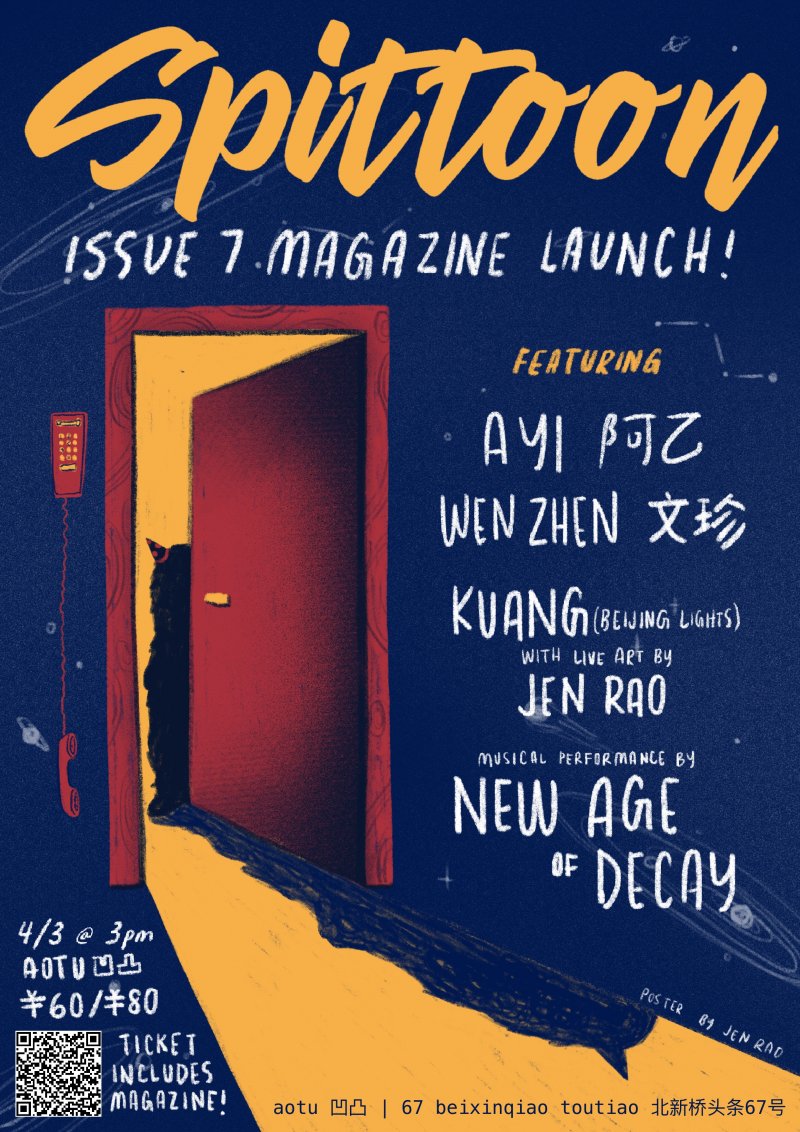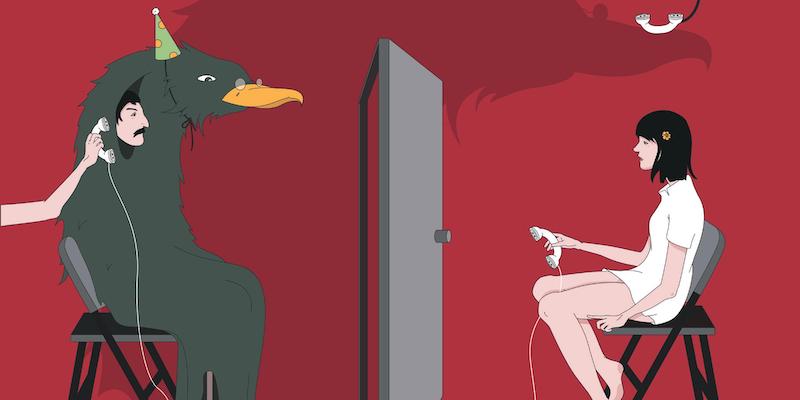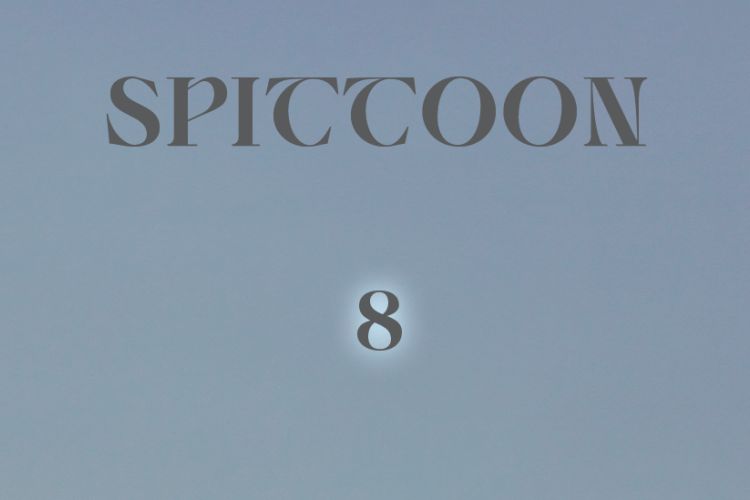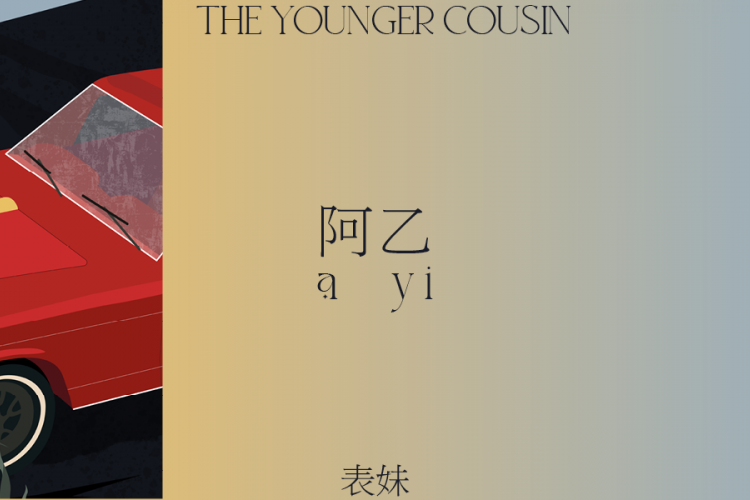Lit Lovers Unite for "Spittoon Literary Magazine" Issue 7 Launch Party, this Saturday at Aotu Space
Though nobody might’ve sensed it at the time, back in 2016 Beijing’s literary arts community experienced something of a tectonic shift. That was the year that Spittoon – which had already fostered a thriving community of artists, poets, musicians, and writers – would launch the inaugural issue of Spittoon Literary Magazine, effectively immortalizing the groups’ ethos in print. Now, five years and six published issues later, the venerable collective will be unveiling Spittoon Literary Magazine Issue 7, with a release party on Saturday, Apr 3, at Aotu Space.
Ahead of the event, we caught up with co-editors Xiao Yue Shan and Zuo Fei to talk about SLM’s international reception, the challenges of balancing bourgeoning and established talent, and the genesis of Issue 7.

The big development with the release of Issue 4 in 2018 was a renewed focus on showcasing Chinese writers with English translations, as opposed to the mix of Chinese and English voices that previously filled Spittoon Literary Magazine’s pages. Two years on, what has the reception been like?
Xiao Yue Shan: The pivot to translation by SLM (Spittoon Literary Magazine) initiated the arrival of a vital contribution to the purview of contemporary Chinese letters in the Anglosphere. I actually became a part of the editorial team right after our previous EiC, the indomitable Simon Shieh, made that change, but it still seemed to me more of a natural evolution than a decisive alteration in the vision of Spittoon. All of us involved in literature know of the incredibly vast array of publications, and considering the intensive labor and dedication that this work requires, there is nothing much that sustains a litmag beyond the passion, dedication, and sheer love by the people involved. That is to say, nobody does it for the props or the clout; we do it because a world imagined in complicity with the voices we are bringing to the table is a far more magical, intensified, and wondrous place. In the selection of Chinese translations available to English-language readers, I’ve more often than not experienced disappointment in the ways in which it falls short; I don’t mean any disrespect at all to the translators working out there – it’s just that Chinese is a language that can be read in so many ways, in choreography with history, context, modernity, politics, emotions, and interpretation. It contains within its intricacy of characters and dialectics all three variations of poetry named by [Ezra] Pound: melopoeia, phanopoeia, logopoia. Therefore, in translation, it requires an equally variegated chorus of voices in order to adequately represent its beauties and potentialities. Spittoon is a part of that vision.
Zuo Fei: I joined a Spittoon event in the Spring of 2018, became a translator that year for Issue 4, and took the additional responsibility of editing for Issue 5 and 6 in 2019, working together with Shelly (Xiao Yue Shan), the managing editor at that time, and Simon Shieh, the then-EiC. For Issue 7 in 2020, I had to work harder with Shelly, because we were the only two main people there to pull things off, but of course with strong support from Simon, David Huntington – another editor, and Matthew Byrne, the founder, and director of Spittoon. SLM came into being when Matthew and Simon decided there should be a Spittoon publication, and then made a turn for contemporary Chinese writing, just because Spittoon was set up in Beijing (having since expanded to other big cities in China, like Chengdu, Xi’an, Dali, Shanghai); although now Spittoon is spreading out to other parts of the world, its growing Chinese presence justifies a good-quality literary magazine dedicated to today’s China, where so much is going on these days.

Spittoon has always been a place for budding writers, artists, and thinkers, however, as the group continues to grow, becoming more and more a global institution, it likewise has the capacity to attract established creators, such as the highly-acclaimed author and poet Wen Zhen, who will be giving a reading and discussion with A Yi, another accomplished writer, at the Launch Party on Apr 3. How do you, as the editors of Spittoon Literary Magazine, leave space for new voices while also embracing the magazine’s increasing role as a formidable player in the literary arts scene, both here and abroad?
Xiao Yue Shan: I think the question as to how to balance excellence in quality with a great encapsulation of China’s immense range is something that Sophie and I both encounter text to text. She and I are both poets, and I can’t speak to her criteria, but because of a poet’s sensibilities, I am always looking for that point in which the otherworldly, celestial music of that ars poetica meets the earthly concerns of the infrastructural day-to-day. When I read through a piece, the medley of up-and-comers with the established both meet this standard in numinous and discreet ways. Chinese literature – being as vulnerable as any nation to the distinctions of caste – often results in a divagation between those who value literature for its capacities for worldly exploration, or aesthetic elevation, or philosophical consideration, so in the construction of each issue, our selections inevitably are as diverse as the occupations of the mind.
Zuo Fei: SLM exists for its own reasons. You might have heard of an English-language magazine about world literature, but the Chinese presentation is meager. There might be an English-language journal about Chinese literature, but works are put there because the authors are famous, the translators pick their favorites, or the editors do their jobs for convenience. There might be an English publication about Chinese letters today, but it could be just for fiction and no poetry, or affiliated with a big publishing house and subjected to its own agenda. On the contrary, Spittoon is a non-profit organization. We choose boundary-defying writings in contemporary China, not just well-established writers, but also emerging voices. Over the past few years, we’ve brought readers good writings in translation: the latest works by literary giants, and the exciting works by young creatives, many of whom have never been put into English before. It’s true we prefer experimental works to conventional pieces, either in contents or in form, hoping the frontier of literature and arts can always be pushed, thus making contributions to literature as a whole. This spirit of pursuing and identifying, like that of China, which has witnessed forty years of industrialization, and twenty years of the Internet, is of great significance.

Is there anything unique to Issue 7 – other than the amazing work of course – that folks should be aware of before they dig into it?
Xiao Yue Shan: Issue 7 was birthed out of a series of impassioned, fiery, and collaborative discussions between the editorial team. At the culmination of Issue 6, Simon stepped down as EiC, at which point the incredible Zuo Fei (Sophie) – who had previously been our Chinese-language editor – and I decided to both take it on equally. There was a lot of talk about taking the magazine online, but Sophie and I were both strenuously averse to the idea. I have an unmovable faith in the irreducible and singular mysticisms of the paper page, and as accomplished and wide-reaching virtual publications can be, I didn’t want Spittoon to meld into the seamless and groundless internet fabric. I wanted the words to have a physical presence, a concreteness that indicated their immense metaphysical presence.
When Sophie and I started working on Issue 7, 2020 was already signaling towards its end. The pandemic had made production in the earlier months somewhat impossible, but she and I both concluded that it would be such a pity to not release a new issue in that schizophrenic maelstrom of a year. So we really scrambled. Sophie in her awestriking capacity gathered a selection of original pieces, we read through and elected them in tandem, and I oversaw their translations to their final drafts. It was such an intense process because of the time constraints we were working under, but I found it such a great instance of syncopation between us at the greater arena of artists, writers, and translators we were working with – that we had all been through something together, survived something together, and therefore we were in conduct through a harmony of wanting to see a work of art come out the other end intact, and brilliant, and victorious.
I always find a vein of something running through each issue; in our editors’ letters, Sophie spoke of redemption and I of resurrection. When the right text arrives before you at the right time, such sacred happenstances occur. I think 2020 was, beyond anything, unimaginable. Yet you see in Issue 7 that what is redemptive, and resurrective, about the unimaginable, is that we as writers as not defeated, but inspired, by it.
Zuo Fei: Issue 7, like other issues, covers a great variety of themes. Just to name a few. Both A Yi and Wen Zhen contributed stories about consumerism, the former in a naturalist and surreal style, while the latter with Yamato-esque touches on the mundane aspect. The story of Lin Zhao, however, strikes me as a cultural kaleidoscope of that part of southern China with a unique artistic style, inevitably making the translation a big challenge but a satisfying job as well. Another theme is urbanization. The poems by Xie Juexiao, a new voice, depict the desolate landscape of small-town factories and the mental close-ups of their residents. If these are more about the material world, Qige Tuoma, another new voice, has a unique communication with the almighty, to seek what we’d call a spiritual or supernatural or metaphysical consolation. And these days, esp. in metropolitan areas, a post-modern existential experience is no better exemplified than in the poems by Liu Waitong, a veteran writer. His investigation into the risks of living can be deeply felt by me, considering the fact that I discovered his newly-cooked poems just a few days before his WeChat blog was shut down.
SLM is a bilingual magazine. With the two languages put together, the bars of translating and editing, therefore, are raised pretty high for professional scrutiny in the industry. SLM, like the regular Spittoon events which are maintained by volunteers and available to all, is a good illustration of voluntary work supported by the whole Spittoon communities. Spittoon takes world-wide resources, translators in this case, and gives the magazine to world-wide readers – there is an amazing overlap among all these people and their roles – they can be writers themselves, but at the same time, a translator, an artist, a reader, or an admirer of another culture, a globe-trotter of the lonely planet, who shares the same values of Spittoon like liberty, openness, exploration, etc.

2021 marks five years for Spittoon’s litmag, and six years for Spittoon as a larger community. What do the next five years hold?
Xiao Yue Shan: I’m wary of future-telling these days, but what I do believe is the ability of the word to seek out, possess, and realize all matters. It is such an honor to work with Spittoon in wielding our own straying paths through the processions of textuality, ever more determined, ever more enraptured. Spittoon Literary Magazine will continue to build on this single, indefatigable, certainty.
Zuo Fei: If culture is scripture for many people today, Spittoon should be there down the road. The magazine will build up its online infrastructure to be accessible to more people, but its physical being, like many old-schooled things, will continue to exist as part of the organic society we have.
Xiao Yue Shan 单小月is a poet and editor born in Dongying, China and currently residing in Tokyo Japan. Of Spittoon Literary Magazine, Tokyo Poetry Journal, Asymptote Journal, and Cicada. shellyshan.com
Zuo Fei 昨非, a resident of Beijing and university English teacher, runs a WeChat platform that introduces foreign poetry to Chinese readers. She was the featured poet of Spittoon Monthly in May 2020. Her work appears in the likes of Poetry of Jiangnan, Mountain Flowers, and Youth Literature. Her collection of essays is forthcoming from Guangxi Normal University Press. She received an MA from Beijing Foreign Studies University in 2000.

The Spittoon Literary Magazine Issue 7 Launch Party will take place this Saturday, Apr 3, at Aotu Space from 3-5pm. Presale tickets are RMB 60, or RMB 80 at the door, and include a copy of SLM Issue 7. Scan the QR code on the poster above to purchase tickets.
READ: Beijing Lights: Nobody Is Born to Be a Thief
Images courtesy of Spittoon







